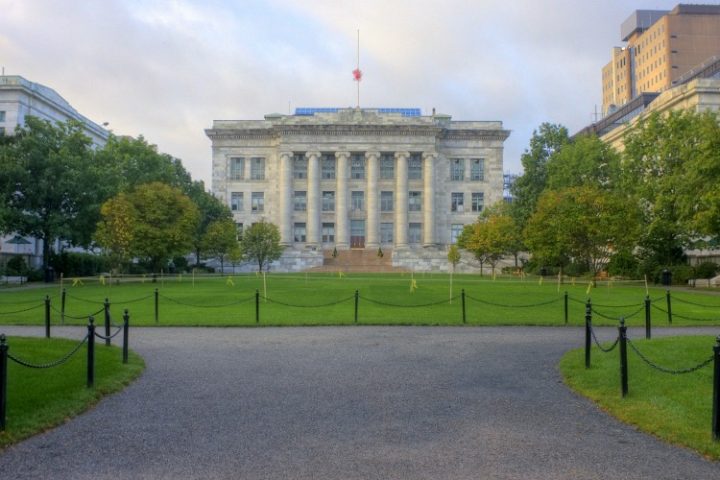
Harvard Medical School
by R. Cort Kirkwood
Yet again, a plagiarism scandal has hit Harvard University.
This time, the culprit is an assistant professor at the medical school, Dipak Panigrahy, who plagiarized “large portions” of a report he submitted to a federal court as an expert witness, Harvard’s Crimson newspaper reported.
But the pilfered prose isn’t just trouble for the plaintiffs in a lawsuit against defense contractor Lockheed Martin. It might mean trouble for Panigrahy. If the judge who declared his work a “mess” is right, Panigrahy violated the university’s guidelines on plagiarism.
The judicial strike against Panigrahy is yet another black eye for Harvard. The university is still dealing — or perhaps it isn’t — with five other cases of plagiarism that have wrecked the institution’s reputation.
The Paper
But Panigrahy’s literary theft is different given where it appeared — not in an academic or professional setting, but instead in a major court case.
“Panigrahy submitted a more than 500-page report on behalf of the plaintiffs in a class action lawsuit against weapons manufacturer Lockheed Martin, alleging the company’s manufacturing facility in Orlando released toxic chemicals into the surrounding area causing various injuries, including cancer,” the Crimson reported:
But in a March 18 court order, U.S. District Court Judge Roy B. Dalton Jr. granted a motion by Lockheed Martin to exclude Panigrahy’s report as evidence, saying that the report extensively plagiarized from works by the International Agency for Research on Cancer.
“Dr. Panigrahy’s report is — put plainly — a mess,” Dalton wrote.
“Indeed, the plagiarism is so ubiquitous throughout the report that it is frankly overwhelming to try to make heads or tails of just what is Dr. Panigrahy’s own work,” Dalton added.
Numerous sections of Panigrahy’s report are word-for-word identical to IARC publications. The passages cite the IARC broadly but are not enclosed by quotation marks.
In an email, Panigrahy told the newspaper he did indeed cite his sources, the newspaper reported.
“I cited to all of the underlying articles and reports that I was accused of plagiarizing, and made clear that I was relying on these sources as part of my analysis,” wrote Panigrahy, a top cancer doc and researcher at the Beth Israel Deaconess Medical Center.
Panigrahy claimed he cited “more than 1100 other works in his report,” the Crimson continued. Maybe, but the judge’s order dealt with that claim:
“His deposition made the plagiarism appear deliberate, as he repeatedly outright refused to acknowledge the long swaths of his report that quote other work verbatim without any quotation marks at all — instead stubbornly insisting that he cited over 1,100 references, as if that resolves the attribution issue (it does not),” Dalton wrote.
“The volume of references actually makes the problems with Dr. Panigrahy’s methodology more glaring, as he admitted that he did not even read the 1,100 papers in their entirety,” he added in a footnote, referring to a deposition of Panigrahy as part of the case.
The report also alleges that at times, Panigrahy misrepresented the IARC’s research.
“Several times, he copied lengthy paragraphs from IARC verbatim but conveniently left out sentences in which IARC urged caution about the limitations of its findings, misleadingly presenting the science as more definitive than it actually is,” Dalton wrote.
Dalton called the plagiarism “rampant” and said Panigrahy’s report “too unreliable to put before a jury.”
The cancer researcher’s testimony in another case is questionable as well, the Crimson reported.
Other Cases
Panigrahy’s is at least the sixth major case of plagiarism at Harvard.
Last week, the Science website uncovered plagiarism in the work of Harvard business professor Francesca Gino. Already on administrative leave after a university probe discovered “research misconduct,” Gino “may also have plagiarized passages in some of her high-profile publications,” the website found:
A book chapter co-authored by Gino … contains numerous passages of text with striking similarities to 10 earlier sources. The sources include published papers and student theses, according to an analysis shared with Science by University of Montreal psychologist Erinn Acland.
Science has confirmed Acland’s findings and identified at least 15 additional passages of borrowed text in Gino’s two books, Rebel Talent: Why it Pays to Break the Rules at Work and in Life and Sidetracked: Why Our Decisions Get Derailed, and How We Can Stick to the Plan. Some passages duplicate text from news reports or blogs. Others contain phrasing identical to passages from academic literature. The extent of duplication varies between passages, but all contain multiple identical phrases, as well as clear paraphrases and significant structural similarity.
Acland, the website continued, put Gino under a microscope after she sued the university business school for $25 million in connection with the accusation of research misconduct. Acland found purloined prose in the first sample she checked.
But Gino’s is only case No. 5
The fourth case was that of sociology professor Christina Cross, who plagiarized her doctoral dissertation at the University of Michigan, a complaint alleged.
The three previous cases were:
- Shirley Greene, Title IX resource coordinator for students;
- Sherri Ann Charleston, chief diversity and inclusion officer; and,
- Claudine Gay, former president, government professor.
Charleston’s husband, LaVar, chief of diversity at the University of Wisconsin, faces plagiarism and academic fraud accusations for recycling work, including that done with his wife, through multiple academic journals.
Harvard’s plagiarism warnings are clear and are available under two links at the university website: Avoiding Plagiarism and What Constitutes Plagiarism?
“It is considered plagiarism to draw any idea or any language from someone else without adequately crediting that source in your paper,” the guide says.
As well, the university warns, “when you fail to cite your sources, or when you cite them inadequately, you are plagiarizing, which is taken extremely seriously at Harvard.”
Not seriously enough, apparently. The university website still lists Gay, Cross, Greene, and Charleston as employees.
